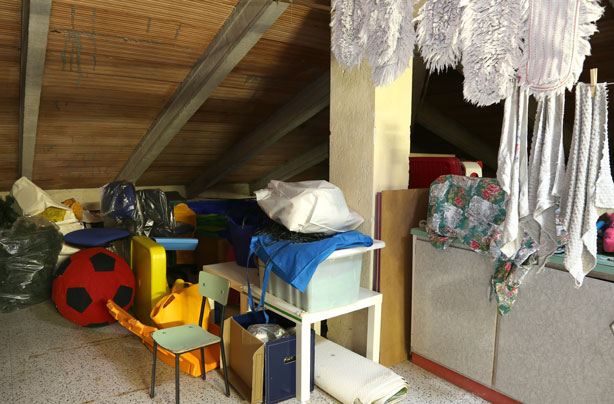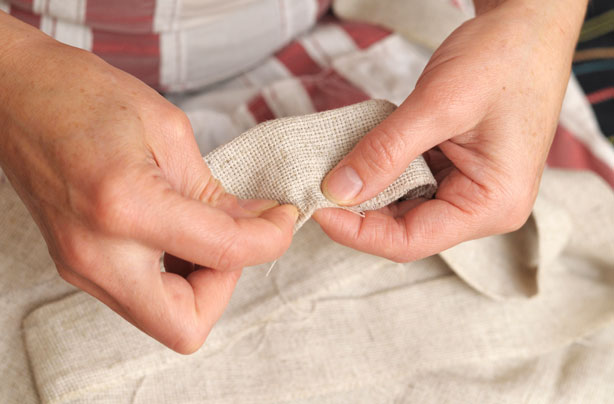50 easy ideas to make more money
If your bank account could do with a bit of a boost, perhaps it's time to think of ways to make extra money. We've teamed up with Moneymagpie.com editor Justine Birtles to come up with 50 ways to do just that!

If your bank account could do with a bit of a boost, perhaps it's time to think of ways to make extra money. We've teamed up with Moneymagpie.com editor Justine Birtles to come up with 50 ways to do just that!
Lots of us have been struggling to make ends meet for the past few years. And if you've been scrimping and saving, but things are still tough, then the idea of making a bit of extra cash probably sounds very appealing.
It's actually much easier than it sounds - and you don't need to resort to doing a paper round to make more money (although if you want to, it's a great way to get more exercise too!). There are loads of ways to get some extra income, perhaps you have a skill that you could sell, a room or driveway you could rent out or just some free time that you could use to get paid to take part in market research or doing someone else's ironing.
Here we've got 50 ideas of easy ways for you to make more money. Whether you want a few extra pounds here and there, or you need hundreds more a month, there's something that'll suit you and we guarantee there'll be a few ideas you've never thought of before. Some of these tips are taken as an extract from A Bit on the Side: 500 Ways to Boost Your Income by Jasmine Birtles
Online surveys
Filling out online surveys is a nice little pocket money earner, but don't be fooled by the scammers promising to make you hundreds a day in exchange for a 'small fee'. They usually send you links to the free websites anyway.
How? Sign up to as many online survey companies as you like. Try Swagbucks where you can earn reward points which convert into 'Swagbucks' which can be redeemed on giftcards for retailers like Amazon. Also, check out valuedopinions.co.uk, which pays in shop vouchers.
How much can I earn? Online research pays between 10p and £2 per questionnaire.
Parenting advice, hot topics, best buys and family finance tips delivered straight to your inbox.
Rent out your driveway or parking space

It might sound strange but if you live near a train station, airport, a big city, football stadium or anywhere else where parking is at a premium, you could make some easy extra money by renting your driveway or parking space.
How? There are numerous websites which let you list your location, rates and any restrictions - have a look at parkonmydrive.com, parklet.co.uk, justpark.com and yourparkingspace.co.uk. Put ads in local newsagents or local papers advertising your parking space. If you've got a garage and you live in a big city, you might be able to rent it out through a property letting agent.
How much can I earn? Find out what the daily parking charge is at your local train station and offer a competitive rate. Depending on where you live, you could make anything from £10 a day to thousands a year. It's worth bearing in mind that income may be taxable, you should have a written contract and make sure neighbours aren't put out, especially if it's a double shared driveway. Whether you own your property or rent it out, you should also check the terms of your lease, mortgage and insurance.
Mystery shopping

Thousands of ordinary people in the UK make extra money by going shopping, eating out in a restaurant or just popping out for a drink. If you become a mystery shopper, you'll be sent to places like shops, pubs and ticket offices and asked to report back on the service you receive.
How? Register with mystery shopping companies. You'll find a list at moneymagpie.com.
How much can I earn? Fees per visit vary between companies, but are usually between £6 and £20. Expenses are reimbursed, so your food and drink are paid for if you're at a restaurant.
Walk dogs

Dog walking is an excellent idea if you hate the gym but want to get active. Full-time jobs and busy lives mean that many people don't have time to look after their pets during the week.
How? Pet minding could just be feeding a cat a couple of times a day, or cleaning out smaller animals like rabbits and hamsters while owners are away on holiday. The best way to start is to ask anyone you know who has a pet if you can be of use to them. Once you've gained a couple of contacts, you may find your services are recommended by word of mouth. Also, go to your local vet's surgery and ask whether they would be prepared to put an advert on their noticeboard or in their window.
How much can I earn? Charges depend on your area and what you think people can reasonably afford. You should charge per day for pet minding and per dog for dog walking. For example, dog walkers in London can charge up to £15 per dog.
Life modelling

If the idea of making extra money from just sitting around doing nothing sounds good to you, then life modelling could be just the way to earn a bit of extra cash. Sessions usually last about three hours and you don't have to pose naked! Fully-clothed modelling is also an option.
How? Contact local art schools and adult education colleges for information on how you can offer your services. You can also put ads up in local art schools offering your services. Once you've worked for a few artists or schools, word should get about that you're available for life modelling, which should bring in more work.
How much can I earn? In London, life models make between £7 and £8 per hour for clothed modelling, and between £10 and £11 for unclothed sittings. Expect to be paid 10% less outside London.
Be an extra

Anyone can be a film extra or walk-on. You don't need any acting ability or a particular look.
How? Contact some extras agencies and get yourself on their books. An agency can charge you for taking your photograph and including it in their books, but it should be a low fee. Make sure the agency you sign up with is registered with BECTU (the media and entertainment union), as there are rogue agencies that will charge you money to register and then do nothing for you.
How much can I earn? The basic day rate for extras is £83.72, but you can earn up to £200 a day.
Rent a room

If you have a spare room, renting it out on a temporary or full-time basis is a great way to make extra money. You can make up to £4,250 a year from renting a room before you have to pay tax on the income.
How? There are lots of ways of finding people to rent a room in your home, and many of them don't cost a thing. Probably the best way is to tell your friends and colleagues that you have a room to rent. There are also websites that you can post on for free, including gumtree.com and roomsforlet.co.uk. Local newspapers are another good advertising resource, or you could try a local managing agent (but expect to pay a fee).
How much can I earn? It depends on what sort of room you have in what sort of home, and most importantly, where you live. It could be anything from £40 a week for a modest room in the suburbs to around £250 a week if you have a fabulous place in the heart of London.
Work in a shop or cafe on Saturdays

This can be easy work to get if you live near a town with lots of shops or an out-of-town retail park.
How? You can often get weekend work with a shop or cafe simply by going in and asking. There are also employment agencies that provide shop assistants, particularly in large cities.
How much can I earn? Around the minimum wage (£6.08 for over 21s), although if you have experience in a similar area of retail you may be able to earn more.
Deliver

There are all sorts of things that need to be delivered to homes in your area: local papers, leaflets, forms for compiling the electoral roll and so on, all have to be delivered by someone.
How? Many of these jobs are temporary and are often advertised in your local job centre. In London you can be paid to stand at train stations handing out copies of the Evening Standard, Shortlist and more.
How much can I earn? About £5 an hour on average.
Invigilate exams

Your Local Education Authority will often need invigilators for GCSE and A-level exams, and local colleges, universities and adult education authorities need outside invigilators, too.
How? The easiest way to do this at university or college is to be recommended by a person who already invigilates. You can also contact the various exam boards requesting work or you could go direct to the local schools or colleges.
How much can I earn? A half day (i.e. a 3-hour exam) will pay about £45.
Iron

There's a big demand for people who can iron, as it's a particular pet hate of many professional men and women.
How? Look out for adverts locally in newspapers and shop windows, or promote yourself in a similar way. Some people have ironing done regularly, while others may just need it done if they haven't got the usual time to do it themselves.
How much can I earn? £5-£8 a session, but you could try to find a deal offering you payment by the hour.
Care for plants

If you have green fingers and some time on your hands, you could help others in your area have healthy, happy plants all year round and make extra money, too.
How? You can either offer your services as a plant minder for local people when they go away (try a leaflet drop or an advert in a local newspaper). Or, you can offer a plant hire service as well as plant care. This is quite a big business already, particularly in cities where there are lots of businesses that like to have plants in their offices but don't want to look after them. You could set up your own operation if you have a good greenhouse, love plants and have the time to travel round to local offices and homes once or twice a week. To do this, send letters to businesses in your area that you think would benefit from your plant hire and care services. Address your letter to the office services or administrative manager, or the general manager in the case of a hotel. You can also place ads in the small ads sections of the business trade press.
How much can I earn? Anything from £20 a week for looking after the plants in a neighbour's home to thousands a month if you have a good plant hire and care business. A very successful plant hire business would require a van and you'd have to spend quite a bit on plants, growing and care materials.
Work in a bar

This is one of the easiest kinds of evening or day work you can get. Pretty much anyone can do bar work as long as their English is good enough and they can do basic maths.
How? You can often get employment in bars and pubs by just popping in and asking if there's any work available. You can also pick up jobs like these in local papers, magazines and on websites like fish4jobs.co.uk and gumtree.com.
How much can I earn? You'll probably earn minimum wage (£6.08 for over 21s) or a little more for bar or restaurant work.
Fundraising

Be a face-to-face fund raiser. Raise money for charity and get paid for it. Just don't expect to be loved by the public!
How? Some charities are directly looking for fundraisers. Try Shelter and Concern.
How much can I earn? Between £8 and £10 an hour, with the added incentive of a possible raise if you sign up more than the required quota of donors (usually 2 or 3 a day).
Clean

If you know how to dust, wash up, vacuum and polish, then you're in luck, as there is a huge demand for cleaners all over the country, particularly in big cities.
How? You can either go down the private route or through an agency. If you go privately, start by advertising with a card in the window of your local newsagent or in your local paper. Otherwise, look out for adverts from people wanting cleaners.
How much can I earn? £5-£10 an hour, depending on where you are in the country.
Be a poll clerk

This is an important job which many people don't think about. Election day polling stations have to be staffed in order for a government to be elected.
How? Apply to your local authority expressing your interest and they'll put your name on the list. It's better to do this sooner rather than later, so don't leave it until the week before election day. You can also apply to help count the ballot papers in the evening, but be aware that this is pretty frantic work.
How much can I earn? About £230 a day.
Market research

Some companies have a pool of people they can call on regularly to join a focus group. If you're chosen to take part in a group, you'll go to an office and sit around a table giving your opinions on a product or an advert or something similar. It could be anything from electric blankets to ice cream or BMWs.
How? There aren't too many of these companies about and some prefer to find their researchers by cold calling, but you can sign up with Saros.
How much can I earn? You can make between £30 and £100 for a two-hour session depending on what you're talking about in the focus group.
Psychological research

There are sometimes ads looking for people to take part in psychological tests. The tests are usually pretty easy, involving either brain scans or simple memory exercises. You'll be paid cash for your time and to cover travel expenses, although many centres will only recruit in their local area.
How? Look out for ads in local papers, on student noticeboards and on the internet.
How much can I earn? From around £10 to £60 per session.
The school run

More and more working parents need someone to pick up and care for their children between the end of school and the time they get back from work. You don't have to be a qualified nanny to do this.
How? You could either sign up with an agency or advertise your services in a newspaper or newsagents. You'll need to have an up-to-date CV with no gaps in it that are not explained, a copy of a police check (which you can get through your local police station), copies of relevant certificates and written references. You should also have an up-to-date first aid certificate. You'll be more likely to find work if you've got a driving license and a car.
How much can I earn? You should earn a minimum of £5 an hour, but if you live in London or have to care for more than one child, it might be more.
Sell your hair

Extensions, wigs and hair pieces are increasingly popular and many are made out of real hair. European hair is particularly popular, so if you have long, flowing locks and were going to get them cut anyway, why not make extra money out of your tresses?
How? The main buyer of real hair for wigs is wigsuk.com. You send your hair, tied in a ponytail, to them and if they can use it, they'll pay you for it. If not, they'll send it back. It doesn't matter what colour your hair is, but it must be at least 10 inches long, and must have no chemical treatments at all (like colouring or perming).
How much can I earn? You'll get paid bet between £3-£5 per ounce, longer hair will get the highest fees. You're not going to get rich by selling your hair, but if you were going to get it cut anyway, why not make a bit of extra money?
Babysit

If you've got a way with children, or have kids of your own, babysitting is an excellent way to make extra money.
How? You can offer your services by word of mouth, you could put an advert in a local newsagents or newspaper or you could join an agency like Sitters which places babysitters with families all over the UK. If you're going to go through an agency, you'll need some childcare qualifications or experience in childcare.
How much can I earn? Rates will vary depending on where you live and how you get the job, but on the whole babysitters are paid a minimum of £5 per hour, rising to £10 an hour in central London and on bank holidays.
House sit

House sitting involves living in someone's house while they're away, so you'll get free accommodation in return for taking care of their home. You're also making the property safer by being there, as it'll be less likely to be burgled. You'll have to keep things clean and tidy, and you might have to do some gardening or look after a pet.
How? You can start house-sitting and minding for your friends, family and neighbours, but it's easiest to house-sit regularly by registering with an agency like Trusted House Sitters.
How much can I earn? Between £120 and £150 a week.
Grow fruit and vegetables to sell

If you have green fingers and a nice big garden, you could making extra money selling surplus fruit, vegetables and flowers to individuals, shops or at local farmers markets.
How? Grow more fruit or vegetables than you normally would and when they're ready to sell put a notice on your front gate to attract passers-by. You could also put adverts in local papers or sell the produce at a local farmers' market.
How much can I earn? It depends on what you sell and how much of it. Anything from a few pounds a week if you just have some spuds to sell, to hundreds a week if you have a large garden and you sell from your front gate or from a market stall.
Run a Bed and breakfast

If you have a few extra rooms in your house, you could run it as a bed-and-breakfast hotel. There's more work involved than just renting and more legal requirements, but it can be a good way to make extra money from your home.
How? First, decide whether there is demand for accommodation of this sort in your area. For example, do you live in a place that attracts lots of tourists? Is there a local theatre that has actors needing a place to stay for a few weeks at a time? If you live in a dull town, nowhere near transport, where nothing really happens, it might not be worth bothering. If you think it's worth it, register your business with your local tourist authorities to attract custom. Contact local theatres and colleges and make sure you're on their list of recommended places to stay.
How much can I earn? It depends on where you are, what you're offering, how many bedrooms you've got and how often they're occupied. It could be anything from a few hundred to a few thousand pounds a month.
Become a driving instructor

There are various schools of driving such as the British School of Motoring (BSM), which allow instructors to use their names as a franchise. But if you prefer, you could run your own part-time business training people in your own car instead.
How? If you're a good, safe and confident driver you could become a driving instructor in your spare time, although you will have to devote some time and money to it at the start. To qualify as a Department of Transport Approved Driving Instructor you need to pass three exams and meet certain requirements, such as holding a full British driving license for a minimum of four years. Once you have the qualifications you need, you can decide whether you want to work for yourself or become a franchisee. If you choose to work for a bigger company, you'll have to pay a certain amount each week to them, but you'll get a brand new dual-control car and they'll help you find students, too. If you run your own operation you'll need to buy a car with dual controls.
How much can I earn? Normal rates are around £15 - £26 an hour, depending on where you are in the country.
Offer a holiday home for pets

If you love animals and have a fairly big house or lots of land, you can make a fair amount of extra money offering holiday homes for pets.
How? Put an ad in the local newsagents and put the word about that you can take animals in your own home. If you already have a dog, you'll probably meet other dog owners while out walking, so talk to them. And you could also put an advert in the local vet's practice.
How much can I earn? For pet-sitting at home you can probably negotiate a price of £50-£200 per animal per week. Keep the costs down by getting the owner to provide enough food and litter for while they're away.
Rent out your house

It might seem drastic, but if you're serious about making some extra money, moving out of your home and renting it out can bring in large amounts of cash without too much hassle for you.
How? You can either let your place through a lettings agent (you'll probably find several on your local high street) or do it yourself by advertising in local freesheets, on the internet and in newsagents. A lettings agent will advertise the place themselves and should take references from prospective tenants. If you're letting the place yourself, you should ask for (and check) at least two character references, including one from their employer. You should also ask for a reference from their bank manager.
Once you've found a tenant, draw up a contract with them including an itinerary of all the furniture and utensils. You can get a sample contract and itinerary in a lettings pack from WH Smiths. Take a deposit of at least six weeks' rent (this should be given back to the tenant when they leave, minus anything you have to spend on lost, damaged or broken items).
How much can I earn? Depending on where your property is and what it's like, you can make anything from £100 to thousands a week. Of course, you'll have to live somewhere else while you're renting your house out, so make sure you can find somewhere with cheaper rent (unless you know someone who'll put you up for free!).
Rent out storage space

If you have a large cellar, loft or garage that you don't use, you could rent it out as storage space.
How? First, empty out areas that you'd like to rent out for storage and work out how much clean, dry space you have in square metres. Ring up local storage companies and find out what they charge and what they offer. Work out a rate that will compete with this and advertise in your local papers. If you have a cellar or garage with direct access you'll be able to charge more because you can offer clients their own key and 24-hour access. You should have a contract signed by both parties which includes rights and duties on both sides. If you're renting to strangers, it's a good idea to include a clause that their boxes do not include stolen goods, illegal drugs or other illegal materials!
How much can I earn? It depends on the amount of space you have and where you live. It could be anything from around £5 a week for storing a few boxes in your loft to around £50 for filling a garage in central London.
Turn your garden into an allotment

If you don't have the time or energy to do anything with your garden yourself, why not let others have the benefit of it?
How? If you have a large garden with direct access you could offer all or part of it as an allotment. Mark off a part that you're happy to rent out and let it be known around the neighbourhood that it is for rent.
How much can I earn? Not loads. On average, allotments in Britain cost between £10 and £30 a year.
Propagate seedlings

If you have green fingers, a greenhouse and some patience, you can make money out of propagating seedlings and selling them to garden centres, local shops and individuals.
How? You need to be a good gardener who already has experience in propagating seedlings. A greenhouse is important, along with the right soil and right equipment. If you have particular favourite flowers or vegetables that you like to grow, when you're propagating the seedlings fill more trays than you need and sell the extra ones. Go to your local garden centre and tell them about the seedlings you have and see whether they would be interested. You could put an ad on your front gate if you want to sell to passers by and you could also advertise in local freesheets or your newsagent's window.
How much can I earn? Anything from £100 to £2,000 a month if you work at it.
Rent a room to foreign students or visiting lectureres

If you fancy renting but don't like the idea of having someone permanently in your home, renting it to foreign students or lecturers visiting a local university could be an ideal way to make extra money.
How? Look for English schools near you (either in the yellow pages or on the internet) and ring them up and ask to be put on their list of local accommodation providers. Good ones will want to see your place before they recommend you. English language students tend to be young, from 18, but are sometimes mature business people. If you live near a university you may be able to rent your room to visiting lecturers. These kind of rentals can last from a week to six months. Some will only need to stay part time but others will want to stay weekends as well.
How much can I earn? It depends on where you live. In London, it's usually about £100 a week for bed and breakfast or £150 with dinner.
Make sweets

If you like to make sweets at Christmas and for personalised gifts, why not make extra money from it?
How? To get started, you need to get as many people as possible to try your sweets, so consider a stall at a local market (you might want to share a stall if they're quite expensive to hire). You can also put adverts in shops and local papers, especially around special dates like Christmas and Valentine's Day. It's also a good idea to have a website.
You really need to use the homemade aspect of your product as the selling point. You'll need to have attractive, attention-grabbing packaging, too, and if you're going to sell on the internet you need to think about cheap postage/packaging costs.
How much can I earn? Once you've got a good reputation you can start charging higher prices, but first you'll need to start with more modest pricing. You won't be able to match supermarket prices if you want to make a profit, but people will generally pay more for the novelty of handmade sweets.
Become a tour guide

Do you like the sound of your own voice? Do you like the idea of a captive audience? Do you have an interest in local history? Then you'd make an ideal tour guide.
How? In theory, anyone can set themselves up as a tour guide. Just learn about an area you're interested in, prepare your tour and advertise in local papers, tourist offices and hotels. It's a good idea to come up with a theme for your tour - ghost walks or murder walks are often popular. If your tour is good, then word will get around, but because your main client base will be tourists, you'll need to keep advertising to each new crop of people coming into the area.
If you want to do it properly, it's worth taking a course with the Guild of Registered Tour Guides, as most tourist offices and attractions won't be interested in you if you're not accredited. The main Blue Badge course can take between seven and 13 months to complete and costs £1,000 - £2,500. If you get a Blue Badge qualification you can do tours all over your region.
How much can I earn? Between £75 and £100 for a day, or even more if you run your own event and you get 20 people or more at, say, £5 each.
Become a Virtual Assistant or Secretary

Virtual Assistants (VAs) are there to help small businesses who can't afford full-time secretarial support or need help with occasional typing or admin work.
How? There's no set way a VA business operates. You'll need a spare room (or at least a clear desk away from the kids), a phone, a modem and a PC. You'll need the ability to correct mistakes in emails while talking to suppliers you've never heard of about products you don't understand! Find clients by trawling the Yellow Pages, calling your friends and searching the internet. You'll have to call businesses, persuade them to take you on and chase them until they pay. Alternatively, you could try a Google search and contact a Virtual Assistant agency to see if they're recruiting.
How much can I earn? Clients are charged a fixed hourly or daily fee, but what you earn depends on the level of service you offer. Agencies charge up to £150 per client per day, but typically you'd charge between £10 and £20 per hour for routine secretarial work done by phone or email.
Paint and decorate

Anyone who is experienced and skilled in painting and decorating can make extra money this way, as so few people are.
How? There's not a lot to painting, but with more complicated jobs like wallpapering, tiling and putting up borders, you'll need to have enough experience to be confident that you can do it. You may want to work on an ad-hoc basis and just respond to adverts or offer work around your neighbourhood. In this case, it would be fair to use their ladders and just take your own brushes. If you're thinking of running a bigger business, you'll need your own kit, including ladders and a van, and you should consider advertising and having your own website.
How much can I earn? A normal rate for a painter is around £50 a day, or £100-£150 if you're in London.
Tutoring

What do you know that others need to know? Perhaps you're bilingual and could give language lessons or you're a musician and you could teach others to play.
How? Anyone can put themselves forward as a tutor of anything. Just putting a postcard in the window of your local newsagent or library could attract interest. However, if you want to do it through an agency or adult education centre, you'll probably need a teaching qualification.
How much can I earn? Prices range from around £10 to £20 per hour.
Sewing, dress making and altering

People who can sew are becoming few and far between, as are people with the time to learn. If you can make clothes, or alter or mend them, you will be in demand.
How? If you've been making or altering clothes for family and friends for a while, offer your services to the public through adverts in the local press and leaflets in local fabric shops. If you're good, a lot of work will come your way through word of mouth. If you'd like regular work, contact a local dry cleaners which offers alterations as well.
How much can I earn? Prices for this kind of service will vary depending on where you're based, so ask around - possibly in fabric shops and dry cleaners - to find out the going rate. Averages are about £5-£10 per hour with a minimum charge of £5.
Gardening

We're more aware of the value of our gardens than ever, but not many of us have the time to do anything with them.
How? Unless you've got skills in design, you're more likely to be offering your services in areas like mowing, pruning, planting and sowing seeds. Lots of work is likely to come through word of mouth, but take advantage of any free adverts you can place in the local press and online. You can also drop leaflets through the doors of houses that look like they need some green fingers. Try targeting the more upmarket streets in your area as they're more likely to invest in 'staff'.
How much can I earn? It's reasonable to ask for between £8 and £10 an hour, depending on where you live and what other gardeners are charging.
Fitness instructor

Yoga, fitness or dance tuition can be done either at local fitness clubs, dance centres or in your own home if you have room.
How? Leading a class requires more than energy and fitness - you need confidence, leadership skills and a good understanding of the exercises you're teaching. Once you've established your own area of expertise you can advertise in shops with cards and posters. The best place is probably in health food shops to target more health-conscious people.
How much can I earn? It's reasonable to ask for £3-£5 per student per session and £10-£20 for a one-to-one session.
Train dogs

If you love animals and can handle people, too, there's a whole world of possibilities in the animal training area.
How? If you're knowledgeable about dog training and have a good success rate in the field, you can either run classes that teach owners how to train their dogs, or offer to train them yourself one at a time. As long as you have experience and are confident, you can put up adverts in the vets, but a lot of your work will probably come from word of mouth. You'll need to be insured personally and professionally, and you should have human first aid training and basic dog first aid abilities.
How much can I earn? You can charge dog owners around £4-£8 per session if they want to come along to the odd class. A reasonable price for training a dog for an entire day would be around £15. If you're going to offer more intensive courses that include accommodation and food for dogs, you could charge around £100-£150 per week.
Childminding

If you'd like to stay home to look after your kids but would like to make extra money, too, this is a particularly good way of doing it.
How? As a childminder you can look after other people's children while tending to your own, although you're only allowed to look after six in total: three under-fives and three between the age of five and eight years. Contact the Children's Information Service for a recruitment pack. You can also find more information on the Professional Association for Childcare and Early Years website. Once you're approved, you'll be included on a list that councils send to families who enquire, and you may be contact by one that's close to you.
How much can I earn? There's no fixed fee per hour but the average is about £2.30 per child per hour for full-time care and £2.44 for part-time care.
Children's entertainer

There's huge demand for fun and charismatic people to entertain at children's parties. You'd be amazed how much work there is just in your local area.
How? Obviously you need some sort of act. It helps if you're already skilled in magic, balloon-modelling, juggling, crafts or comedy, but even if you don't have these skills, if you love children and know how to keep them enthralled for half an hour or more, you'll be able to find work in your area.
Once you have an act that works (try it out for free at family and friends' parties), make sure you're advertising in the right places. The Yellow Pages is a good place to start and you can also use sites like gumtree.com. It might also help to have a website with your picture, a description of your act and some comments from happy customers.
How much can I earn? It depends where you live and how many gigs you get. In London, the going rate is around £15 per child with a minimum of around 15 children. Outside London, it's about £10 per child. It's useful to get your clients to sign a contract before the event, to ensure you get paid on the day.
Cake making, decorating and jams

Making and selling jam and cakes can bring in money at fairs and if you're good you could supply local tea shops and upmarket delis.
How? It's as simple as making the food and selling it. The main challenge is to keep up-to-date with fairs and fetes in your area. The best way to get your cakes sold in a shop is to go round cafes and delicatessens, find out which sell homemade products and talk to the manager. As with any business involving food, you might get visits from the environmental health department, so it would be worth going on a course that deals with hygiene and health and safety.
How much can I earn? It depends on how much you produce and what levels of sales you get. It could be anything from a few pounds at a local fete to thousands a year if you sell specialist cakes for weddings or have an upmarket range of jams and chutneys that you sell to local delicatessens or somewhere like Selfridges.
Trimming hedges

There's a lot of demand for this in the suburbs, but less in the cities or country.
How? Just by walking round your area you'll be able to tell if there's enough gardens with hedges in need of a trim. Drop leaflets at houses that could use your services (especially in the wealthier areas). It would probably be easiest to start working over weekends and gradually build up from there.
How much can I earn? You can normally charge around £20 - £30 per hedge, but it depends on the area you're working in and the size of the hedge.
Proof reading

A perfect job for home workers with an eye for detail. Publishers still tend to work from printed manuscripts, however, so it's not as email friendly as you might think.
How? Do a web search for book publishers in a subject area you like. Don't think you can bluff your way through: a medical proof reader who doesn't know what 'endogenous' means is wasting everyone's time. Work can be hard to find, but you can try checking a freelance portal like freelancewriting.com. Having specialist knowledge greatly improves your chances. If you've got some, search for relevant publishers and email them. Keep your emails short, witty and persuasive. If you're not sure if you've got what it takes, The Society for Editors and Proofreaders has an online test you can take.
How much can I earn? The Society for Editors and Proofreaders recommends a minimum hourly rate of £19.25 for proof-reading and £20.75 for copy editing.
Answering service

So many people work for themselves now that the demand for office services such as people to answer calls when they're out is pretty strong.
How? Advertise your services in local business magazines and newspapers, local Chambers of Commerce and on the web. You'll need to guarantee that you can answer calls for them (if they redirect them to you when they go out the office), during office hours or whatever hours they need. You'll need a good phone manner, a quiet room and a computer which you can send the messages by email to your clients.
How much can I earn? It depends on how many clients you have and how much you charge. You could charge per call or charge a flat rate per day or week.
Beautician

Freelance beauty work is fun to do and there's a big demand, particularly for weddings and seasonal parties.
How? The services of a beautician can include facials, makeovers, manicures, pedicures, hair removal and so on. Many beauticians will also have knowledge of other areas such as hairdressing or massage. As well as these skills, you'll need to be good with people to put them at ease, especially if you offer bikini waxing! For most beauty work you'll need qualifications, but there are some aspects, like manicures and pedicures, that need very little training. Working from home has the advantage of privacy for clients and can encourage customer loyalty as it's a more friendly environment. You could also offer beauty parties where you go to someone's house so the guests can all have treatments together. You could also offer a special wedding package for brides.
How much can I earn? Beauticians coming to your home tend to charge between £35 and £75 per hour, depending on what the treatment is.
Writers' research

There are all sorts of organisations and individuals that need research done for them - for example novelists, TV producers and film writers may all need someone to research topics. The work can often be done from home.
How? If you have a good education you'll already have many of the necessary skills for researching, although it'll help if you have some experience, too. Finding work is mostly a question of putting up and answering ads. The Society of Authors has a quarterly journal called Author, where researchers can advertise their services to writers. You could also take a look at writers' forums such as writersservices.com and writernetwork.com. Once you've started, if you're good, efficient and reasonably priced, you should get work through word of mouth.
How much can I earn? It depends on the type of project but researchers can generally expect to be paid between £8 and £20 an hour.
Tutoring and therapies online

Everyone has a skill they could teach others. Tutoring is an excellent use of home-alone time.
How? Teaching one-to-one (music lessons, for example) tends to be less profitable than classes (yoga, for example). But all this is changing with the use of webcams, instant messaging and video conferencing. With a little research and a small investment you could be teaching a dozen pupils in 6 different countries how to do the lotus position. Once you've perfected your talent and you're looking to start imparting wisdom (whether online or face-to-face), advertise in your local shop window, by word of mouth and on free websites like gumtree.com.
How much can I earn? You're restricted to standard local rates. Piano teachers earn between £10 - £25 per session. A yoga teacher with classes of 5 can make hundreds of pounds per day. See what your rivals are charging and price yourself somewhere in the middle.
Make curtains and soft furnishings

Making your own curtains and soft furnishings isn't just a way of saving money - you can turn a profit by making them for others, too.
How? If you have a sewing machine and you're confident about making curtains and soft furnishings, all you need to get started is to get the word out. Let friends and family know that you're available to make these items. It would also be a good idea to advertise in a furnishing fabric shop or shops selling things for the home. Stress to shops that any customers you get you will direct to them for homewares and fabric.
How much can I earn? The best way to make a good wage is to assess how long the job will take then agree on an hourly rate. A rough idea of the hourly rate for making a pair of curtains is around £10.
Trusted, informative, and empathetic – GoodToKnow is the ultimate online destination for parents. At GoodtoKnow, our mission is 'simple': we're trying to make sense of parenthood. On the site, you'll find everything you need for a happy, healthy family life. Our huge archive of content includes more than 18,000 articles and 1,500 how-to videos. These include expert-backed advice features on parenting, dealing with relationship changes after having a baby, self-care for mums and managing your family finances. We also feature tried-and-tested product reviews and buying recommendations for every stage of family life - from prams and Moses baskets to birthday gifts and top toys.